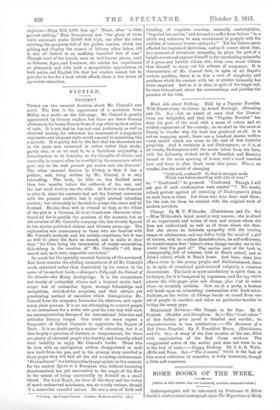FICTION.
VICTORY.
THERE are two unusual features about Mr. Conrad's new novel. The first is the appearance of a quotation from Milton as a motto on the title-page. Mr. Conrad is greatly appreciated by literary readers, but there are fewer literary allusions in his books than in those of any other modern author of note. It is not that he has not read judiciously as well as observed acutely, for otherwise his command of a singularly expressive and eloquent style would amount to something like a miracle. It is partly due to the fact that his characters are in the main men immersed in action rather than study ; partly also, or so we read it, to a fastidious originality, a disinclination to be beholden to the thoughts of others; and assuredly he cannot often be troubled by the annoyance which gave rise to the wish percant qui nostra ante nos clixerunt The other unusual feature in Victory is that it has a preface, and, being written by Mr. Conrad, it is very interesting. The book, he tells us, was finished more than two months before the outbreak of the war, and the last word written was the title. At first he was disposed to alter it, since the contents had not the faintest connexion with the present conflict, lest it might mislead intending readers ; but ultimately he decided to accept the omen and let it stand. He also does well to remind us that, as the villain of the plot is a German, he is no brand-new character intro- duced ad hoc to gratify the passions of the moment, but an old member of Mr. Conrad's company who has already figured in two stories published sixteen and thirteen years ago. The explanation was unnecessary to those who are familiar with Mr. Conrad's methods and his artistic conscience, but it was as well to place the facts on record, and to make it clear that, "far from being the incarnation of recent animosities, Schomberg is the creation of" Mr. Conrad's "old, deep- seated and, as it were, impartial conviction."
So much for the specially unusual features of the new novel. But there remains the abiding unusualness of all Mr. Conrad's work, enhanced rather than diminished by his return to the scene of his earliest books—Almayer's Folly and An Outcast of the Islands—the Malay Archipelago. It is the unusualness not merely of outlandish climes and a tropical exotic land. scape, but of 'unfamiliar type., strange friendships and antipathies, unhooked-for surprises, and that oblique yet penetrating method of narrative which distinguishes Mr. Conrad from his compeers, fascinates his admirers, and repels many plain persons. It is no use attempting to convert people to an enthusiasm for a writer who goes his own way with such an uncompromising disregard for conventional formulas and orthodox literary usages. One could no more expect a frequenter of Ballad Concerts to appreciate the fugues of Bach. It is no doubt partly a matter of education, but it is also largely a question of instinct, or temperament, for there are plenty of educated people who frankly and honestly admit their inability to enjoy Mr. Conrad's books. Those who do turn with an anticipation seldom disappointed to each new work from his pen, and in the strange story unrolled in these pages they will find all the old arresting enchantment. "Enchantment" is a term peculiarlyappropriate in this context, for the central figrsre is a European who, without becoming denationalized, has yet succumbed to the magic of the East to the extent of living contentedly by himself on a small island. Yet Axel Heyst, the hero of the story and the victim of much undeserved mischance, was no moody recluse, though sf a somewhat scornful nature. He was a man of birth and
e Victory. By Joseph Conrad. London: Methuen and Co. L6s.]
breeding, of exquisite courtesy, naturally contemplative, "beguiled into action," and doomed to suffer from failure "in a subtle way unknown to men accustomed to grapple with the realities of common human enterprise." Yet his failure never affected his ingrained Quixotism, and so it comes about that, in a moment of chivalrous sympathy, he plays the part of a knight-errant and exposes himself to the unrelenting animosity of a gross and hateful villain, who hires even worse villains than himself to carry out his scheme of vengeance. It is characteristic of Mr. Conrad that, in spite of all Heyst's curious qualities, there is in him a core of simplicity and goodness which his contact with lax or sinister humanity has never impaired. And so it is that, in spite of his tragic end, be rises triumphant above his surroundings and justifies the paradox of the title.














































 Previous page
Previous page